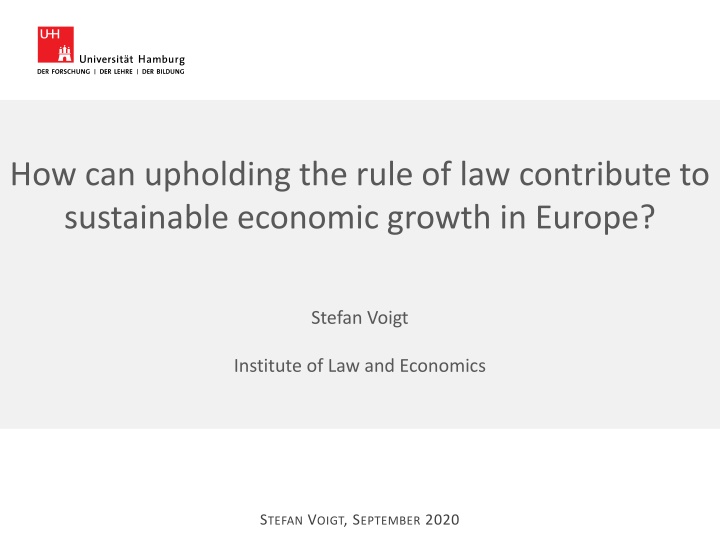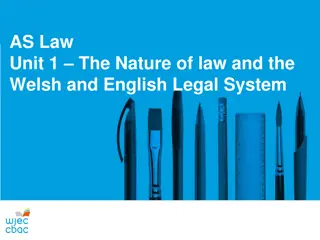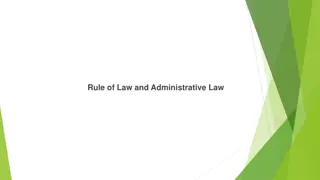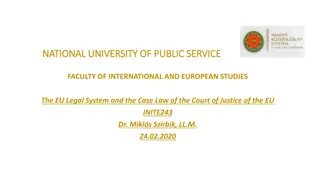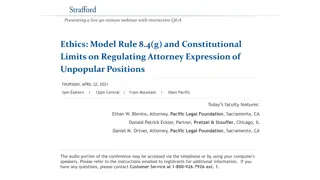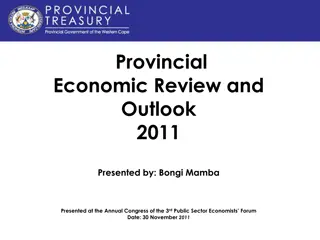Upholding the Rule of Law for Sustainable Economic Growth in Europe
Democracy and the rule of law are essential for sustained economic growth in Europe. The rule of law ensures stable and impartial enforcement of rules such as property rights and contract law, key for market economies. Upholding the rule of law is crucial for combating corruption and maintaining a functioning court system. The EU can assist in strengthening the rule of law by improving measurement mechanisms and raising awareness through campaigns.
Uploaded on Oct 06, 2024 | 2 Views
Download Presentation

Please find below an Image/Link to download the presentation.
The content on the website is provided AS IS for your information and personal use only. It may not be sold, licensed, or shared on other websites without obtaining consent from the author.If you encounter any issues during the download, it is possible that the publisher has removed the file from their server.
You are allowed to download the files provided on this website for personal or commercial use, subject to the condition that they are used lawfully. All files are the property of their respective owners.
The content on the website is provided AS IS for your information and personal use only. It may not be sold, licensed, or shared on other websites without obtaining consent from the author.
E N D
Presentation Transcript
STUDIEREN AN DER UNI HAMBURG sustainable economic growth in Europe? How can upholding the rule of law contribute to Stefan Voigt Institute of Law and Economics v STEFAN VOIGT, SEPTEMBER 2020
Introduction Both democracy and the rule of law have been under stress in Europe and beyond. Main point of the opinion: the rule of law is a necessary condition for a market economy which contributes to sustained economic growth. As an economist, I am used to tradeoffs; not here: the rule of law is desirable per se and contributes to economic growth. And this is why action should be taken to uphold and strengthen it in Europe. v 1 STEFAN VOIGT, SEPTEMBER 2020
Why is the rule of law a necessary condition for market economies? Market economies rely on decentral coordination usually implemented by way of contracts. In order to create wealth, market economies need general rules. Property rights, contract law, Growth depends on investment; it will only come about if the rules are perceived as stable and reliably and impartially enforced. A functioning court system with judges who are independent from government and the parties to a conflict is key. Moreover, the court system needs to be timely. Corruption implies that rules are not impartially enforced and is, hence, incompatible with the rule of law and sustained economic growth. v 2 STEFAN VOIGT, SEPTEMBER 2020
How can the EU help to uphold the rule of law? Deviations from the rule of law in single member states decrease the value of being a member of the EU for all member states ( negative externalities ). Therefore, most member states should have an interest in policies strengthening the rule of law. The opinion suggests to further improve the various existing mechanisms such as Art. 7 TEU, the infringement procedure, budgetary consequences etc. Here, I just focus on two specific points: v 3 STEFAN VOIGT, SEPTEMBER 2020
How can the EU help to uphold the rule of law? (2) (1) Improve the measurement of member state performance regarding the rule of law Introduce indicator that explicitly takes the compliance of substantive legal provisions with the rule of law into account (and not only procedural ones as is the case to date) Rely on information of those who are users of courts and other judicial services (2) Strengthen awareness of the rule of law As the rule of law is an abstract concept, its advantages are difficult to grasp Awareness campaigns reaching out to many groups could, in turn, strengthen the support in favor of the rule of law v 4 STEFAN VOIGT, SEPTEMBER 2020
Thank you very much for your attention! v 5 STEFAN VOIGT, SEPTEMBER 2020
